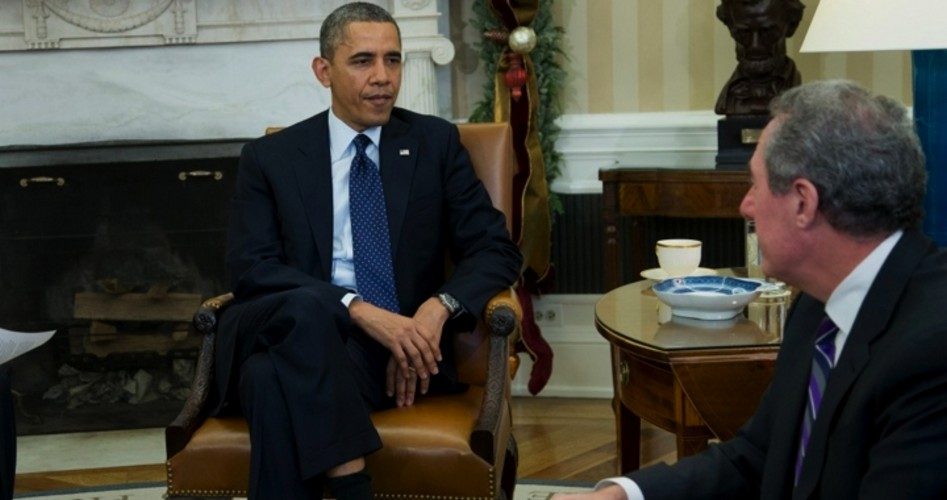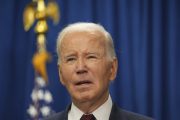
Despite mounting opposition in Congress and in the country, on December 16, President Obama made it clear that he intends to continue pushing for prompt passage of the Trans-Pacific Partnership (TPP).
On that day, the president hosted an Oval Office gathering of high-level trade officials, inviting press photographers to chronicle the meeting. The confab took place just days after the latest round of negotiations on the Pacific Rim trade pact wrapped up in Singapore.
“This remains a top priority of the president because of the positive economic benefits that come from it,” White House spokesman Jay Carney told reporters.
“Congress and the American public have high expectations for the TPP. The administration is determined to get the best deal possible, and we are pleased with the progress made towards achieving an ambitious, comprehensive, high-standard agreement,” he said at a White House press briefing on Tuesday, December 17.
Apparently, the president and his corporate underwriters have high hopes that the 12-nation (at present) trade deal will be signed soon after the New Year, after they were forced to abandon hopes that a completed draft would be waiting under the White House Christmas tree.
In terms of a real deadline, it is unlikely that the agreement would be hammered out before the president takes a scheduled trip to Asia in April. This visit to would-be TPP partners would provide the president the opportunity for a personal appeal to his colleagues to speed up the TPP approval process.
As it stands today, the TPP is being negotiated by Australia, Brunei, Canada, Chile, Japan, Malaysia, Mexico, New Zealand, Peru, Singapore, the United States, and Vietnam.
There is news, however, that South Korea will soon sign on to the sovereignty transfer posing as a trade pact.
In fact, although President Obama has stated that one of the chief purposes of the TPP is to “pivot” Asia away from China, in an interview with Chinese state-run media, he indicated that he would be open to entertaining an application from China to join the group.
In November, China Daily reported:
China and the United States strongly intend to engage each other in the Trans-Pacific Partnership, a “high-standard” trade agreement involving the US and other countries including Japan and Australia, according to insiders close to both governments.
There’s that “high-standard” talking point again.
When examined under a constitutional lens, the TPP is revealed to be a bigger threat to liberty than ObamaCare (as outlined in this informative video by The New American).
On December 11, the Washington Post published 10 points about the TPP purporting to be “everything you need to know about the Trans Pacific Partnership.”
One need not read the entire piece to understand the Post’s position on the question of whether the TPP is good for America. The first item on the list reveals to readers the newspaper’s editorial bent. In answer to the question, “What is the Trans-Pacific Partnership,” the Washington Post explains:
Basically, it’s a giant free trade deal between the U.S., Canada, and 10 countries in the Asia-Pacific region that’s been under negotiation for nearly a decade now (it began as an agreement between Singapore, Chile, New Zealand and Brunei before the U.S. took the lead in 2009). It’s expected to eliminate tariffs on goods and services, tear down a host of non-tariff barriers and harmonize all sorts of regulations when it’s finished early next year.
If the Washington Post were around in Noah’s time, they likely would have described the global deluge as a little shower.
So, putting aside the obvious errors of the Washington Post’s TPP primer, the crucial task of defining the TPP remains. Here are a few things everybody should know about this massive disenfranchisement of Americans masquerading as a “job creating” trade deal.
First, although congressional leaders from both major parties have called for fast-tracked approval of the TPP, it is curious that federal lawmakers (ostensible representatives of the people) would push for ratification of a multi-national treaty they have never read. Perhaps they are adopting Representative Nancy Pelosi’s “we have to pass the bill so that you can find out what’s in it” protocol.
The irrefutable fact is, no one in Congress has seen a single sentence of what is sure to be a several-thousand-page agreement.
Time and again, lawmakers have been straight-armed by U.S. Trade Representative (USTR) Michael Froman when they’ve tried to get a look inside the secret document and the frightening compromises being made by the USTR at the TPP negotiations.
As The New American has noted, “Incredibly, while the Obama administration denies access and information to the officials whom the American people have elected to represent them, it gives special access to big corporations, labor unions, and ‘stakeholders’ whom the administration has selected to ‘represent’ the American people on its so-called ‘advisory committees.'”
Senator Sherrod Brown (D-Ohio) summarized the situation very well when he said, “It’s telling that it is easier for the CEO of a major corporation to access information about the negotiations than the American people’s elected representatives.”
Next, we pose an equally important, though unanswered question: If the TPP is so good for the U.S. economy, why are the negotiations being carried on in such well-protected secrecy?
In another analysis of the TPP, The New American’s William F. Jasper points out the likely reasons for the government’s commitment to keeping the negotiations hush-hush:
If there is one word that is used more often than “reform” by governments, politicians, and international organizations — and abused even more frequently and egregiously — it is “transparency.” As with the United Nations and the World Trade Organization (WTO), the White House and the U.S. Trade Representative’s (USTR) office regularly proclaim their commitment to transparency while doing everything possible to hide their actions from their constituents. The USTR’s “Fact Sheet: Transparency and the Trans-Pacific Partnership” is intended to give the impression that the Obama administration is forthrightly providing the American people with all the up-to-date information they need to accurately evaluate the agreements that are being made in their name, and that would, if accepted by Congress, devastatingly impact their lives, their liberty, and their future.
Apart from the secrecy, a few drafts of key provisions of the TPP have been leaked to the Internet. One thing all the leaks reveal is that large corporations would be allowed to assume powers that constitutionally belong to Congress and to the states.
Notably, in both statements announcing the hemispheric enlargement of the trade bloc, former U.S. Trade Representative Kirk places the approval of “domestic stakeholders” (read: large corporations) on a level with that of Congress. It is precisely this exalting of big business, as well as the as-yet-impenetrable wall of secrecy surrounding the drafting of the TPP treaty, that has troubled many of the people’s representatives in Congress.
Although the treaty negotiations are being kept under a thick veil of secrecy, a draft document leaked to the Internet discloses that as part of its membership in the TPP, the United States would agree to exempt foreign corporations from our laws and regulations, placing the resolution of any disputes as to the applicability of those matters to foreign business in the hands of an international arbitration tribunal overseen by the secretary-general of the United Nations.
This article lists only a couple of the considerable problems with the TPP. The New American has published and will continue to publish articles exposing the TPP’s threats to our Constitution and to the fundamental liberties it protects.
Photo of President Barack Obama meeting with USTR Michael Froman Dec. 16: AP Images
Joe A. Wolverton, II, J.D. is a correspondent for The New American and travels frequently nationwide speaking on topics of nullification, the NDAA, and the surveillance state. He is the host of The New American Review radio show that is simulcast on YouTube every Monday. Follow him on Twitter @TNAJoeWolverton and he can be reached at [email protected]



